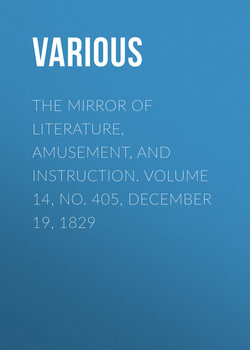Читать книгу The Mirror of Literature, Amusement, and Instruction. Volume 14, No. 405, December 19, 1829 - Various - Страница 6
THE SELECTOR; AND LITERARY NOTICES OF NEW WORKS
ОглавлениеMARSHAL NEY
[No apology is requisite for our introduction of the following passage from the life of Marshal Ney, in a volume of the Family Library, entitled "The Court and Camp of Buonaparte."]
In the campaign of 1813, Ney faithfully adhered to the falling emperor. At Bautzen, Lutzen, Dresden, he contributed powerfully to the success; but he and Oudinot received a severe check at Dennewitz from the Crown Prince of Sweden. From that hour defeat succeeded defeat; the allies invaded France; and, in spite of the most desperate resistance, triumphantly entered Paris in March, 1814. Ney was one of the three marshals chosen by Napoleon to negotiate with Alexander in behalf of the King of Rome, but the attempt was unsuccessful, and all he could do was to remain a passive spectator of the fall and exile of his chief.
On the restoration of the Bourbons, Ney was more fortunate than many of his brethren: he was entrusted with a high military command, and created a knight of St. Louis, and a peer of France.
But France was now at peace with all the world; and no one of these great military chiefs could be more unprepared for the change than the Prince of Moskwa. He was too old to acquire new habits. For domestic comforts he was little adapted: during the many years of his marriage, he had been unable to pass more than a very few months with his family. Too illiterate to find any resource in books, too rude to be a favourite in society, and too proud to desire that sort of distinction, he was condemned to a solitary and an inactive life. The habit of braving death, and of commanding vast bodies of men, had impressed his character with a species of moral grandeur, which raised him far above the puerile observances of the fashionable world. Plain in his manners, and still plainer in his words, he neither knew, nor wished to know, the art of pleasing courtiers. Of good nature he had indeed a considerable fund, but he showed it, not so much by the endless little attentions of a gentleman, as by scattered acts of princely beneficence. For dissipation he had no taste; his professional cares and duties, which, during twenty-five years, had left him no respite, had engrossed his attention too much to allow room for the passions, vices, or follies of society to obtain any empire over him. The sobriety of his manners was extreme, even to austerity.
His wife had been reared in the court of Louis XVI., and had adorned that of the emperor. Cultivated in her mind, accomplished in her manners, and elegant in all she said or did, her society was courted on all sides. Her habits were expensive; luxury reigned throughout her apartments, and presided at her board; and to all this display of elegance and pomp of show, the military simplicity, not to say the coarseness, of the marshal, furnished a striking contrast. His good nature offered no other obstacle to the gratification of her wishes than the occasional expression of a fear that his circumstances might be deranged by them. But if he would not oppose, neither could he join in her extravagance. While she was presiding at a numerous and brilliant party of guests, he preferred to remain alone in a distant apartment, where the festive sounds could not reach him. On such occasions he almost always dined alone.
Ney seldom appeared at court. He could neither bow nor flatter, nor could he stoop to kiss even his sovereign's hand without something like self-humiliation. To his princess, on the other hand, the royal smile was as necessary as the light of the sun; and unfortunately for her, she was sometimes disappointed in her efforts to attract it. Her wounded vanity often beheld an insult in what was probably no more than an inadvertence. In a word she ere long fervently regretted the court in which the great captains had occupied the first rank, and their families shared the almost exclusive favour of the sovereign. She complained to her husband; and he, with a calm smile, advised her never again to expose herself to such mortifications if she really sustained them. But though he could thus rebuke a woman's vanity, the haughty soldier felt his own wounded through hers. To escape from these complaints, and from the monotony of his Parisian existence, he retired to his country-seat, in January, 1815, the very season when people of consideration are most engrossed by the busy scenes of the metropolis. There he led an unfettered life; he gave his mornings to field sports; and the guests he entertained in the evening were such as, from their humble condition, rendered formality useless, and placed him completely at his ease.
